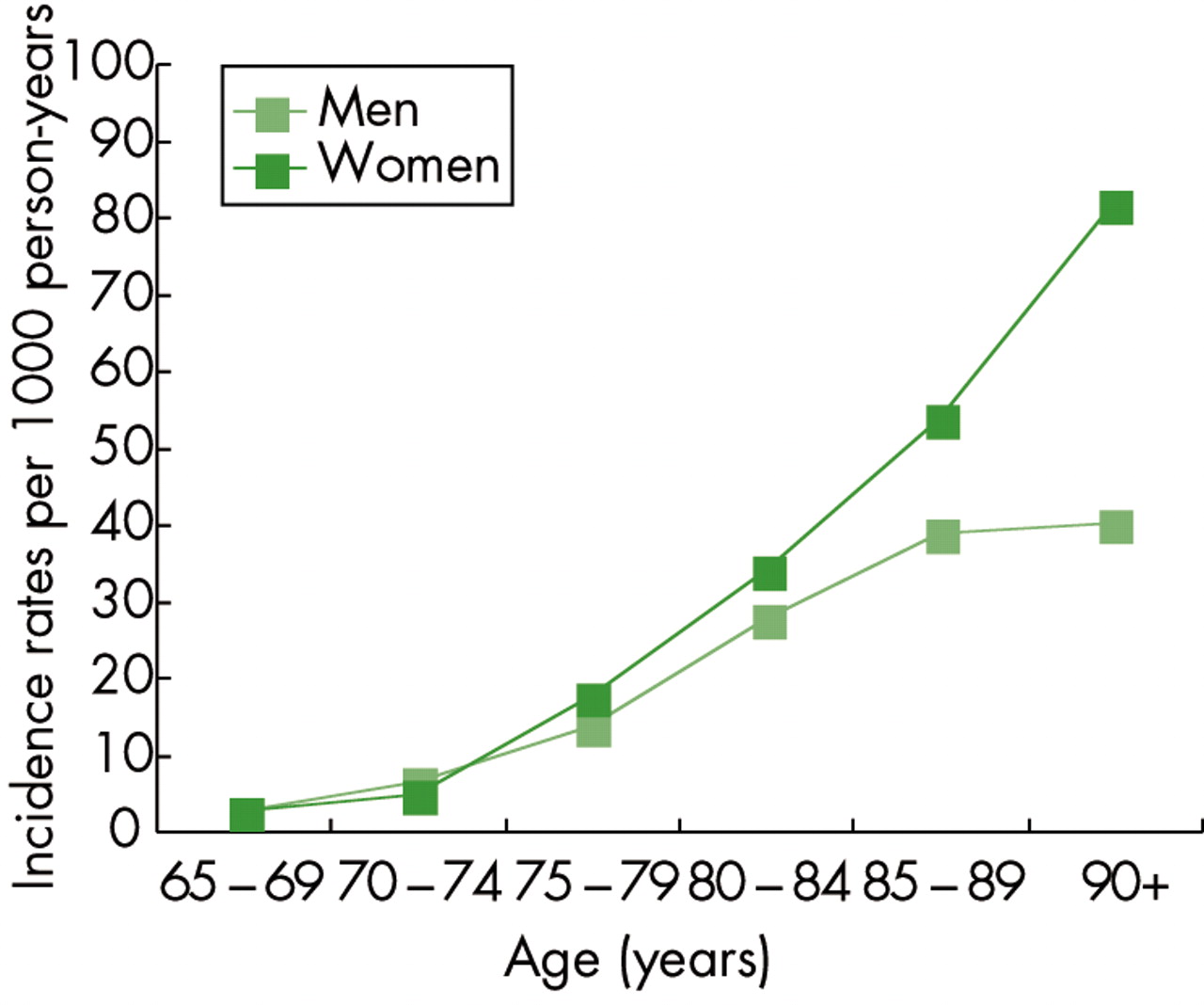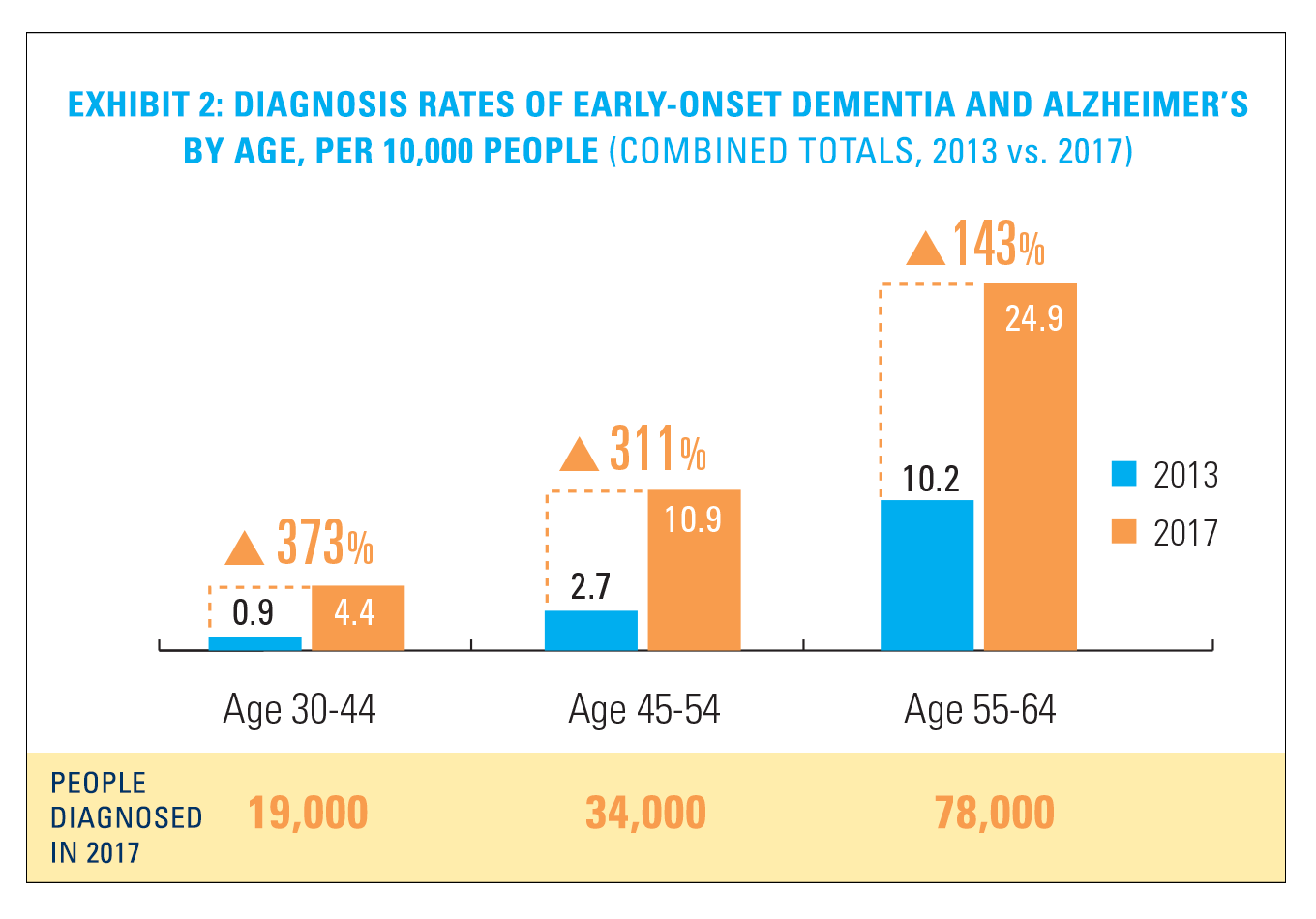Late-onset AD normally affects people who are 60 years and above when Alzheimers symptoms become more apparent. There is no cure for Alzheimers disease but some medications can slow the progression of symptoms.
 Epidemiology And Risk Factors Of Dementia Journal Of Neurology Neurosurgery Psychiatry
Epidemiology And Risk Factors Of Dementia Journal Of Neurology Neurosurgery Psychiatry
Stages of Frontotemporal Dementia.

Average age of dementia onset. People with higher education. Young-onset also called early-onset Alzheimers is an uncommon form of dementia that affects people younger than age 65. Age The strongest known risk factor for dementia is increasing age with most cases affecting those of 65 years and older.
Early-onset dementia is defined arbitrarily and variably as occurring before 60-65. A persons risk of developing dementia rises from one in 14 over the age of 65 to one in six over the age of 80. Oftentimes this mild decline in memory is merely normal age-related cognitive decline but it can also be one of the earliest signs of degenerative dementia.
However age of onset ranged from 17 years to the 80s for people with MAPT mutations and from the 20s to the 90s for the other two groups providing evidence that FTD can occur throughout adulthood the researchers noted. Frontotemporal dementia age of onset can be as early as the age of 40 with 54 being the average age of onset and is often misdiagnosed in younger adults as a psychiatric issue and in older adults as Alzheimers. The one year cut-off time is the generally accepted period by most clinicians.
LBD appears to affect slightly more men than women. Of people with Alzheimers disease develop symptoms before age 65. And average survival times varied from a high of 107 years for the youngest patients 65-69 years to a low of 38 years for the oldest 90 or older at diagnosis.
The mean age of the early-onset group was 56 - 5 years and 74 - 6 years for the late-onset group. Parkinsons dementia on the other hand is diagnosed if the onset of dementia occurs at least a year after the onset of motor symptoms. In most people Alzheimers disease symptoms appear after age 60.
At this stage signs are still virtually undetectable through clinical testing. 8 rows Age. Older adults can start to see symptoms all the way into their 80s.
National Institute on Aging reports that the number of individuals who have AD doubles after 5 years for persons who are above 65 years. So if 4 million Americans have Alzheimers around 200000 to 240000 people have the young-onset form of the disease. What increases the risk for dementia.
Most cases of LBD are found in individuals in their mid-60s and beyond. Age on the other hand plays an important role. They further investigated the impact of.
Its important not to. Lewy body dementia is a progressive disease meaning symptoms start slowly and worsen over time. However some people have noticeable Alzheimers symptoms in their 40s or 50s.
Published by John Elflein Mar 23 2021 In the United States around 36 percent of people with Alzheimers are 75 to 84 years old. About two in 100 people aged between 65 to 69 have dementia and this figure rises to one in five for those aged between 85 to 89. However you may worry that these things are an early sign of dementia.
Someone diagnosed at 65 lives an average of about eight years while someone over 90 who. Early vs late age at onset frontotemporal dementia and frontotemporal lobar degeneration. Additionally around 276 percent of those with Alzheimers are.
These changes are normal but they can be a nuisance and at times frustrating. Lewy body dementia typically begins at age 50 or older although sometimes younger people have it. Family history Those who have parents or siblings with dementia are more likely to develop dementia themselves.
Of all people over the age of 65 have dementia. Patients with FTD and FTLD often develop symptoms after age 65 and age at onset represents an important consideration when making antemortem neuropathologic predictions. The average age at the onset of dementia is around 80 years.
A third of the early-onset AD group presented with non-memory symptoms compared to only 6 in the late-onset group p 0001. Around 3 of women and men who are between the ages of 65-74 have the illness. Concern for early onset of dementia should arise with respect to other symptoms.
This may become noticeable particularly from middle age - usually taken as during our 40s 50s and early 60s - onwards.